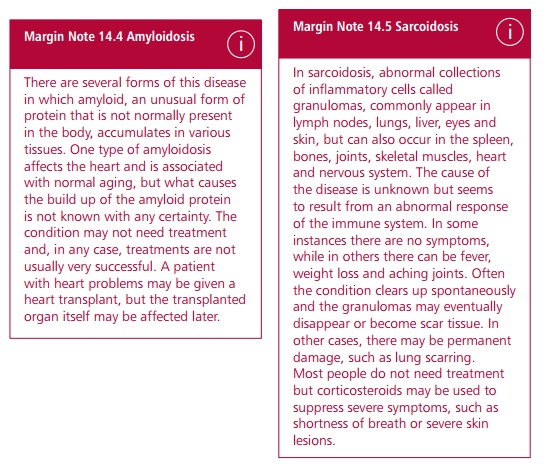Chapter: Biology of Disease: Disorders of the Cardiovascular System
Cardiomyopathies
CARDIOMYOPATHIES
Cardiomyopathy is a progressive disorder that impairs the function of the ventricular muscle walls. It may come about as a result of a number of diseases or may have no identifiable cause.
DILATED CONGESTIVE CARDIOMYOPATHY
Dilated congestive cardiomyopathy is not a single condition but a group of heart disorders in which the ventricles have enlarged but are still not able to pump enough blood to meet the needs of the body. Heart failure may result. The commonest cause of the defect in developed countries is widespread coronary artery disease, which leads to an inadequate blood supply to the heart muscle. This causes damage and the undamaged muscle then stretches in compensation. If this is inadequate to meet body needs, then dilated congestive cardiomyopathy develops. Its symptoms are shortness of breath on exertion and a rapid onset of tiredness due to the weakening of the heart’s pumping action. The heart rate speeds up so blood pressure is normal or low, but fluid is retained in the legs, abdomen and lungs. Enlargement of the heart can mean that the valves do not close properly, leading to leakage, and this improper closing may be heard as murmurs using a stethoscope. The stretching may also increase the potential for arrhythmias. Electrocardiography or magnetic resonance imaging (MRI) may be used to confirm the initial diagnosis.
About 70% of people with the condition die within five years from the onset of symptoms and the prognosis declines as the heart walls become thinner with reduced contractibility. Men tend to survive only half as long as women and blacks half as long as whites. In about half of the cases there is sudden death. Treating the underlying cause, for example reducing alcohol abuse can prolong life. When there is coronary artery disease there may be angina, which is treated with glyceryltrinitrate, A-blockers or calcium channel blockers. There may also be pooling of blood in the swollen heart that can cause clots to form and therefore the patient is given anticoagulants.
Myocarditis, which is an acute inflammation of the heart muscle, occurs as a result of a viral infection, most often coxsackie virus B, hence it is sometimes called viral cardiomyopathy. It may weaken the heart muscle, producing a condition similar to dilated congestive cardiomyopathy. A number of chronic hormonal disorders including diabetes and thyroid disease can also produce cardiomyopathy, as can prolonged alcohol abuse .
HYPERTROPHIC CARDIOMYOPATHY
Hypertrophic cardiomyopathy is a group of conditions in which the ventricular walls thicken. It may occur as a birth defect, in adults with acromegaly or in people with pheochromocytoma, a tumor of the adrenal gland . The heart becomes thicker and stiffer than normal and more resistant to filling with blood from the lungs, leading to a backpressure on the lung veins causing a pulmonary edema. The patient therefore becomes chronically short of breath, with symptoms that include faintness, chest pains and palpitations brought on by irregular heartbeats; the heart sounds through a stethoscope are usually characteristic. Younger patients tended to die suddenly of hypertrophic cardiomyopathy but with better and earlier diagnosis and drug therapies this is now less of a problem.
The main treatments are administering A-blockers and calcium channel blockers. Surgery to remove some of the heart muscle may improve the outflow of blood but this is only undertaken when the patient is incapacitated despite drug therapy.
RESTRICTIVE CARDIOMYOPATHY
Restrictive cardiomyopathy is the least common of the cardiomyopathies. It has many features in common with hypertrophic cardiomyopathy. The replacement of heart muscle tissue with scar tissue or its infiltration with abnormal material, such as white blood cells, amyloidosis and sarcoidosis (Margin Notes 14.4 and 14.5) can all lead to the condition, although its cause is frequently unknown. The major symptoms are shortness of breath and an edematous swelling of the tissues. About 70% of individuals with the disease die within about five years of the symptoms commencing. In most cases therapy is unsatisfactory. The use of diuretics, which are normally given to treat heart failure and reduce the amount of fluid accumulating in the tissues, may actually reduce the amount of blood entering the heart and worsen the condition.

Related Topics